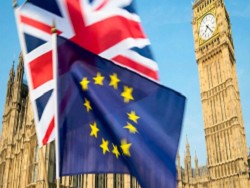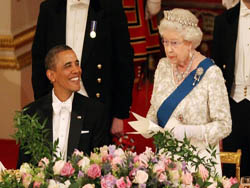
In the Baltic States continue to comprehend possible consequences of Brexit. Creates a twofold picture. Immediately after the referendum press described the reaction of Lithuania, Latvia and Estonia as a shock. But over time, the governments of the three republics began to assert that nothing much will happen. About the possible consequences of a British referendum on EU membership for the Baltic States and the European Union said the head of the Centre for British studies, Institute of Europe, RAS Elena ANANYEVA:
“The British do not accept freedom of movement of labour”
– Elena, information about the impact of Britain on the economy of the Baltic States is very contradictory. What is Your opinion on this issue?
– Let’s look at objective things. The first of them – purely material – is that the Baltic countries receive subsidies from EU funds. And if Britain leaves the EU, the Baltic States will lose subsidies from Britain. The EU has a special program to equalize the levels of development of member countries, the Fund will reduce the share of the UK.
The second factor: anti-Russian front in the EU were Britain, Poland and the Baltic countries. With the exit of Britain this front will be weakened. Opinion Britain had considerable weight in the European Union, given that this is a very major power that shares with France the second of the EU economy.
– In the Baltic capitals there are fears that an exit of Britain would weaken the security of Europe in General and in particular on the Eastern flank. Is that so?
It is important to understand that the private army of the EU has not. The European Union is engaged in peacekeeping and humanitarian missions, but everything to do with defence – it is certainly the prerogative of NATO. Britain from the Alliance comes out. Britain remains one of just four countries that rely annually contribute 2% of GDP in the budget of NATO (along with the US, Estonia and Greece). NATO is the main military stronghold of the EU, and at the Warsaw NATO summit this summer, the EU signed an agreement with the Alliance of cooperation.
– How Brexit will affect the fate of the Lithuanian and Latvian migrants permanently living and working in Britain? After the referendum came reports of growing tension, more frequent incidents and attacks against migrants. Embassies of the Baltic States is very concerned about.
For newly arriving migrants, the situation will definitely change, given the dissatisfaction that has accumulated in the British society. I would call the two aspects of issues that concern the British. The first is national sovereignty, i.e. supremacy of Parliament. It is popular opinion that make the laws that govern life in Britain has to a national Parliament, not the unelected bureaucrats of the European Union. The second migration. Migrants arriving from EU countries, in the terminology of Brussels referred to as “mobile EU citizens”. Their influx of Brits just unhappy. Can’t say that the British distinguish between so-called “mobile EU citizens” and the actual immigrants who came from EU countries.
However, in Britain there are clichés – the “Polish plumber” as an irritant. Polish Diaspora becomes the biggest along with the Indians (about 1 million), and the Polish language is second after English in England and Welsh in Wales. The same applies to Latvians and Lithuanians.
There is conflicting information about what will happen to those who are already in Britain. If they can continue to live and work in Britain or not is not clear. It is expected to remain in the country for those who have a residence permit. But the situation for new arrivals is greatly complicated. The fact that in Britain annually drives more than 300 thousand people. Over the past two years the number of European Union countries exceeded the flow from other countries. Hence, taken a serious irritant.
As will be negotiating the UK with the EU is unknown. For a start, article 50 of the Lisbon Treaty on the country’s withdrawal from the EU, the government Theresa may intends to enter into force no earlier than next year. Britain has yet to choose a negotiating team that it is difficult that such experts do not suffice, therefore they are recruited from different institutions and companies.
In addition, Britain needs to formulate a negotiating position on all issues.
And if Britain wants to maintain access to the internal market of the European Union, but to limit the movement of workers, the EU firmly answer “no.”
Throughout its history the EU based on four freedoms – movement of goods, capital, services and labour. Great Britain is interested in the first three, in the movement of goods, capital and services, but does not want the freedom of movement of labour, namely its influx into its territory of the EU. So let’s see what mutual concessions will be London and Brussels. Apparently, the freedom of movement of labor will become a serious stumbling block. The referendum showed that the British this freedom is not accepted. The contradiction in the assessment of key freedoms of the EU will play a greater role in negotiations about the Brexit.
“Cameron has consistently acted on the verge of a foul”
– Reacting to the outcome of the referendum, the former President of Latvia Vaira Vike-Freiberga wrote that David Cameron will go down in history as the least successful British Prime Minister.
– In the reign of Cameron were held three referendums. All three were aimed at the solution of a Cameron partisan, practical problems. The first referendum concerned the electoral system. His point was that government formation in 2010, the conservatives needed a coalition with the liberal Democrats. The liberal Democrats demanded a referendum on changing the electoral system with a majority, best for big parties, including the conservatives, on the system, proportional to close that was profitable, and in turn by the liberal Democrats as a small party. Cameron went to a referendum, although campaigned against the new system. The referendum he won. He was lucky that the coalition government acted and the audience was generally disappointed with the actions of the authorities, in particular the fact that the conservatives have gone on too big concessions to the liberal Democrats, and Vice versa. Therefore, the British voted in principle against the possibility of coalition governments, such a “compromise.”
In the second referendum on Scottish independence – Cameron got lucky, too. He expected that public opinion in Scotland does not change from year to year, polls showed that only slightly more than 30% of Scots favoured independence. The Prime Minister thought that the situation will continue, so the referendum was one question: for or against independence.
He struck out the second question about the extension of the powers of the Scottish Parliament, which Scots voted exactly. So Cameron could go down in history as the Prime Minister, the collapse of the United Kingdom, because two weeks before the Scottish referendum polls showed that the proportion of supporters and opponents of independence equal.
And only thanks to the efforts of the three leading political parties and even “neutral” intervention of the Queen, who advised the Scots to “think seriously” before taking the decision, the referendum ended successfully for the government of Scotland remained in the UK.
The third referendum associated with the EU, was due to the fact that the elite within the Conservative party are unable to reach consensus on relations with the European Union. This question is very long split in the Conservative party. Cameron decided to bring the question of EU membership to a referendum to the elections of 2015 to keep supporters among voters of the conservatives and not allow them to leave the Party United Kingdom independence (UKIP) openly advocated for Brexit. Cameron needed to maintain the unity of his party, because, as you know, split the party in the elections did not win. In other words, Cameron, solving partisan tactics, won the battle won the election but lost the war jeopardized the strategic objectives and the UK’s position as he understood them, and lost power.
This time he was not lucky, despite anti-Russian rhetoric and phrases foreign Minister Philip Hammond that Brexit will benefit Putin. The British are not scared and voted differently.
Was this choice justified? I can say that the opinion of British people about the EU was not true. They believed that immigrants in the country more than it actually is. They believed that the UK contributes to the budget of the European Union more money than it actually is. They believed that the European bureaucracy spends on administrative expenses of Brussels four times more than it actually is. This was, of course, the fault of the British press, which has been fuelled eurosceptic sentiment in the country. So Cameron is constantly operated on the verge of a foul, for which he paid. In this capacity, he will go down in history.
– Former Minister of foreign Affairs Audronius Azubalis has called the very idea of a referendum a model of irresponsibility. It turns out he was right?
– It is the British Parliament called the “mother of parliaments”. That Britain was an example of a system of checks and balances, separation of powers between the judiciary, legislature and Executive. The Parliament was called in to reconcile the interests of different groups. The fact that Cameron announced the referendum, says that the system of checks and balances, representative democracy, i.e. Parliament, has not worked, and had to resort to forms of direct democracy. The Prime Minister failed to bridge the gap in the establishment.
They were really deep enough, but it seems to me that, if a referendum on Scottish independence was held before Cameron has promised to hold a referendum on Britain’s membership of the EU, he would not promise to hold a referendum on the EU in case of victory of the conservatives in the upcoming 2015 elections.
He gave his promise in January 2013, that is up to the Scottish referendum held in September 2014. Meanwhile, in January 2013, Cameron had hoped that the conservatives can’t win in the parliamentary elections of 2015. Indeed, according to all the polls, the labour party in January 2013 ahead of the conservatives on 10%. Later, their ratings were compared, and it was assumed that the results of the voting will be formed a “hung Parliament” where no single party has a majority, that is, had the option of a coalition government. The Union of tori with his opponent UKIP was absolutely excluded. Remained Irish unionists and the liberal Democrats. Liberal Democrats – a Pro-European party, so a coalition with them, Cameron could not hold the referendum before 2015, as the liberal Democrats are in favour of membership in the EU. Apparently, Cameron had hoped that he simply will not have to fulfill the promise to hold a referendum. However, the conservatives won the most seats in Parliament and formed a single-party government.
It should be noted, no matter how intimidated Prime Minister and Minister of foreign Affairs, “the Russian threat” before the referendum, the British these fears did not budge. In Russia accepted the referendum results. Russian President Vladimir Putin said: “If the organization of the referendum and the subsequent that are available today, the results are nothing like arrogance and superficial approach to the solving of global problems for their own country, and for Europe as a whole, with the leadership of the UK, the consequences will be global in nature, I repeat, they are inevitable; they will be with a plus sign and a minus sign. […] We did not interfere in it, do not interfere and meddle not going to.” Thus, evaluation and Audronius Azubalis about the “blatant irresponsibility,” and Putin’s “arrogance and superficial way in which” in principle are the same.
“Russia is not sent to Britain Lithuanian migrants”
– In the Baltic countries frequently say that Russia makes every effort to split the European Union. This was recently mentioned by the foreign Minister of Lithuania Linas Linkevičius, the Estonian President Ilves. In light of Brexit in parallel, expressed the opinion that “the plan worked: Britain could become the trigger for the disintegration of the EU. What do You think about this?
– The EU has its own objective deep contradictions that do not depend on Russia. This is not Russia were sent to Britain “Polish plumbers and Lithuanian migrants, so in that regard, you should not blame on others. In the Baltic States there are no jobs, so the population goes out to other European countries – at what here Russia? The EU must resolve its contradictions, to deal with their problems and to develop a common position. Objectively it turns out that in the process of expanding the EU entered a very different country, and to reconcile the interests of all these different countries becomes difficult. Hence the contradictions between them (North-South), the crisis in the Euro area (and the British uttered itself the right not to accept financial participation in the rescue of the Eurozone), the immigration crisis, the problems in energy policy (“Nord stream 2 South stream”). As for Russia, the very uncertainty of the situation and shifting balance of power within the EU could impact negatively on Russia. Whether Germany completely dominate the EU? Follow any of the “brexton” “Domino effect” that will cause the inevitable exacerbation of conflict in Europe close to Russian borders? Similar questions for Russia are not academic interest.
So the “interest” of Russia in Brexit – most bluff of those who would do any means to justify the goal to fight and achieve pre-themselves creating a problem.
In complex situations along with problems, it is customary to seek out new positive opportunities. Here in Lithuania and Latvia now hope that migrants from Britain, will return home, this will decrease the outflow of population. In Tallinn there is hope to learn from the London the status of the banking and financial center of the EU. How do You think the Baltic States can still learn from Brexit certain “pros”?
– Tallinn will not be able to become the financial center of the EU though, because this role claim Frankfurt. Before the return of the population, it is necessary to wonder why people went there in the first place? For a better share. In the Baltic States are not so many industries, especially in the industrial sector. It is not known whether returning home to find work. I don’t see options in any way to turn Brexit “a plus” for the Baltic States.
– Will the story of Brexit on the perception of the European project in Eastern Europe whose countries joined the Union about ten years ago?
– The European project will lose in attractiveness. The EU has lots of problems. The islanders voted with an eye on the problem “they have there on the continent.” Recall that the same UKIP in 2014 won the elections to the European Parliament. From the British quota of 73 deputies to the supporters of UKIP got 24 of the mandate, conservatives in General took third place. Now it becomes clear that the European Union served as a model until the financial and economic crisis of 2008-2009. Then came turmoil in the Euro zone, I started talking about Grexit – the possible Greek exit from the European Union. The Greeks are unable to cope with their debts. Difficult situation persists in Italy and Spain. Imposes its imprint migration crisis. Sometimes, the EU has started to resemble the late USSR at the level of bureaucratization and formalization. No wonder there is an increasing popularity of right-wing nationalists: the National front of marine Le Pen in France, the Italian “Northern League”, “Podemos” in Spain. “Alternative for Germany” in September of 2016 was ranked second after SPD in the elections in Mecklenburg – Western Pomerania with 21%. It is noteworthy that this land is a constituency of Chancellor Merkel, from which it was selected in the Bundestag, and the defeat of her party, the CDU/CSU it is here is symbolic. Apparently, the EU will not be a landslide of disintegration, but it is waiting for a serious reformatting.








